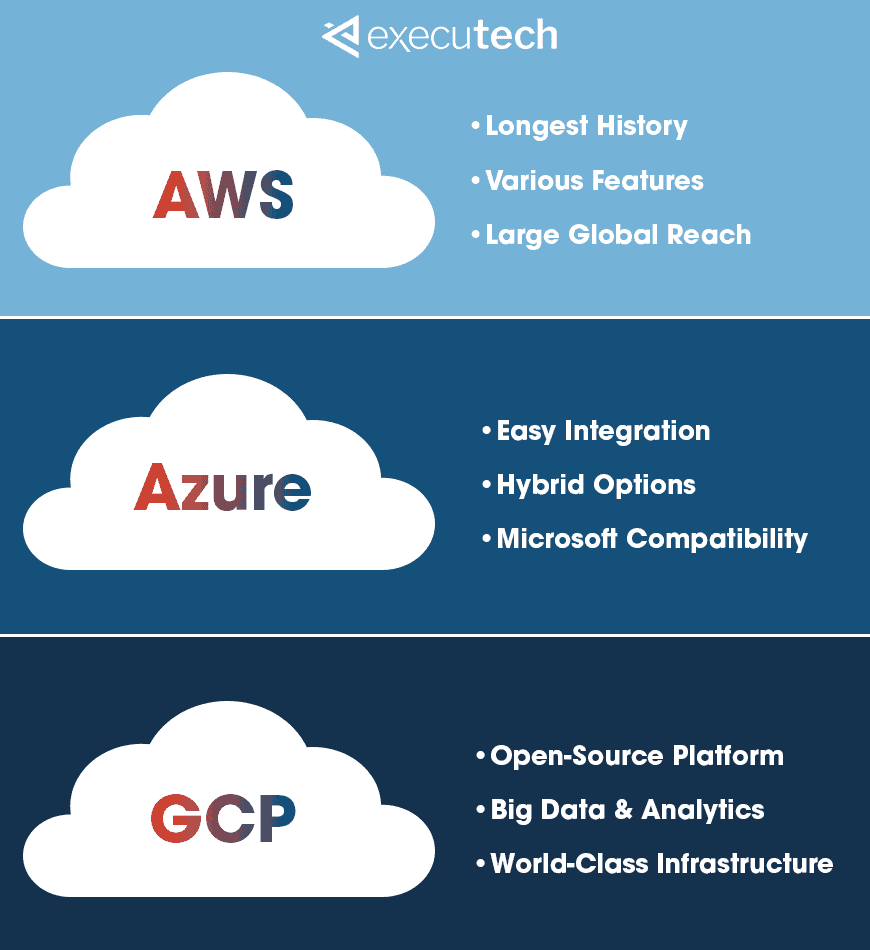In the last decade, the cloud provider space has exploded. Amazon was the first public cloud provider to come to market in 2006, but now less than fifteen years later, many competitors are fighting for space in the lucrative market. And the question companies are asking themselves is no longer “Should we move to the cloud?” it’s now a question of “Which provider should we go with?”
Leading Cloud Providers
No doubt about it, three providers lead the pack when it comes to public cloud services in the US: Amazon Web Services (AWS), Microsoft Azure, and Google Cloud Platform (GCP). And it often comes down to these three choices when companies are making the switch to the cloud.
Now here at Executech, we’re a Microsoft shop, and we deal in Microsoft Azure. But, we’ll be the first to admit that Azure isn’t always the best choice for a company. AWS and GCP both have advantages that might make them a better fit for specific business models. All three providers offer a range of features, provide ample storage, and are strong on security and data protection.
So, what sets them apart? In this blog post, we are going to explore all three providers: the pros, the cons, and why they might be the right choice for an organization. So, let’s jump in!
Amazon Web Services (AWS)
Since Amazon Web Services (AWS) was the first to the market, it seems fitting that we start here. As we mentioned above, Amazon officially launched their public cloud with the introduction of AWS in 2006, years before Microsoft or Google would throw their hats into the ring.
AWS continues to dominate the market today, with 47.8% of the market in its grasp. So, what makes AWS so desirable that it owns nearly half the market share?
Pros
One of the biggest differentiators AWS has to offer its customers is its reputation and experience. The extra few years AWS has had as a provider has given it room to grow its offerings and features bigger than any of its competitors. The numerous services offered are advantageous for large companies and enterprises that have complex needs.
Also, AWS has proven that its services are reliable, and its mature infrastructure can be a big selling point for many companies. They have the largest number of global data centers. Businesses can look at AWS’s track record, global reach, and its current client list and know that AWS provides an excellent service.
Cons
On the other hand, AWS’s main advantage- it’s wide array of services- can also be its downfall. With so many options to choose from, some companies may find it overly complex and confusing. The vast number of choices can be overwhelming to smaller businesses that are just looking for a simple cloud solution.
AWS also can be known for complicated and unclear pricing structures. At one point, AWS only offered per-hour billing, meaning that even if you only used one minute of the service, you would be charged for the entire hour. AWS has recently rolled out per-minute billing, however, to match other providers. While this change has been beneficial for many organizations, their pricing format is still more difficult to understand than other competitors.
Lastly, AWS doesn’t put as much emphasis on hybrid cloud options as some other competitors- specifically Microsoft Azure. So, if you’re looking to integrate on-premise infrastructure with your cloud provider, it can be more challenging with AWS.
Why Companies Should Choose AWS
Looking at the pros and cons, AWS can be a great choice for many organizations. If you’re looking for a cloud provider that has an established performance history, a long list of services, and a large global reach, AWS might be right for you. It’s often a great fit for large corporations and enterprises that need many of the more intricate features AWS offers.
Microsoft Azure
Microsoft stepped into the cloud game in 2010, a few years after AWS made its debut, introducing Microsoft Azure. Although Azure was late to the party, it’s been steadily making up ground, increasing its market share year by year. For example, although AWS still holds the market, its share fell from 49.4% in 2017 to its previously touted market share of 47.8% in 2018. Microsoft, in contrast, grew from a 12.7% market share to 15.5% in the respective years. What’s fueling this growth?
Pros
When you’re talking about the pros of Azure, the first thing you have to mention is the elephant in the room- Microsoft. It’s likely true that we all know and have used or still use Microsoft products. And many organizations rely on Microsoft to help run their systems. If this is the case, Azure can be a great choice for a cloud provider.
Azure offers easy migration strategies in general, but for Microsoft shops, migration can be a breeze. It also provides the benefit of familiarity, relying on tools that many individuals know and use already.
Microsoft Azure is also making strides in the open-source community. Although it works well with other Microsoft solutions, that doesn’t mean you are limited to those. From Linux to Java, Azure plays well with others. This makes configuration and integration easy, allowing companies to take advantage of the software and apps they already use, even if it’s not Microsoft.
Another significant advantage of Microsoft Azure is the emphasis on hybrid cloud models. Many businesses may want to explore a cloud option that combines on-premise infrastructure with cloud services. If this is the case, Azure could be a great fit as they offer a hybrid cloud option for their customers.
Cons
As for the drawbacks of Azure, similar to AWS, the pricing structure can be a bit tricky to navigate. It does offer flexible pricing in-line with the competition, but some expertise might be needed to ensure that your organization is getting the best pricing option.
Secondly, when compared to AWS, Azure does have slightly less features and global data centers. This difference relates to the fact that Azure has not been around for as long as AWS has been. However, Azure is catching up with AWS in these regards, and for the majority of companies, the features offered by Azure are more than enough.
Who Should Choose Microsoft Azure?
One of the biggest reasons a company might choose Azure is that it already runs on Microsoft and Windows. This makes migration effortless, and you’ll get almost as many features as AWS. Also, if you’re looking for a hybrid cloud model, Azure is probably a great fit. Azure offers various ways to integrate Azure with on-premise infrastructure.
Google Cloud Platform (GCP)
Google moved into the cloud market not long after Microsoft, launching Google Cloud Platform (GCP) in 2011. Google is slightly lagging behind Microsoft when it comes to market share, with GCP capturing 4% of the market. However, GCP is known for its innovative capabilities and is setting itself up to gain ground in the coming years. Let’s take a look at what makes GCP great and what factors companies should take into consideration before purchasing.
Pros
The main factor that sets Google apart is its innovative approach to analytics, machine learning, Big Data, and containerization. It should come as no surprise that Google is pioneering new approaches when it comes to the cloud; it’s what sets Google apart in all avenues of their business.
On top of that, GCP runs on the same infrastructure that Google itself runs on- everything from Google Search to YouTube to Gmail. This world-class infrastructure is the biggest and fastest in the world, meaning customers can expect reliable, fast performance. And, Google is working on expanding its global infrastructure using subsea cables.
GCP also utilizes an open-source platform, even more so than Azure, centered on open-source technology. And, possibly the key factor when comparing other providers with GCP is price. When it comes to price, Google often beats out AWS and Azure by offering various incentives and discounts. Google also works to make its pricing structure more transparent and customer friendly.
Cons
As for the cons of GCP, one major one is just the level of features GCP offers in comparison to the other two providers. It may be running on some of the highest-performing infrastructure, but it’s limited in scope.
Along with that, although we mentioned above that Google is using an innovative undersea cabling system to expand their global reach, they still have the least amount of data centers when compared with the other two cloud providers.
Why You Should Choose GCP
If you’re looking for a cloud provider that is innovative and budget-friendly with room to grow, GCP might be the right choice for you. Currently, GCP is most often used as a secondary provider, but with Google’s commitment to new technology, it could very well begin gaining significant market share in the coming years.
Which Cloud Provider Should You Choose?
In the end, if you are trying to decide on a cloud provider, it really comes down to your organization’s network, system, and needs. If you run in Microsoft and are looking for a hybrid option, Azure is a good bet. If you’re looking for innovative analytics and Big Data tech on a budget, you might want to go with GCP. Or, if you are looking for a cloud provider that has a long-running history of reliability and performance with a laundry list of services, you should check out AWS.
Or, you can always choose to go the multi-cloud approach and use more than one cloud provider. If this is the case, you can match each provider with the features that best fit the needs of your business’s different systems.
We hope this article helped you compare the three largest US cloud service providers: AWS, Azure, and GCP. If you are curious to see the cloud in action, check out this case study showcasing how one company was able to grow their business, increase efficiency, and improve their security by moving to the cloud with Microsoft Azure.






